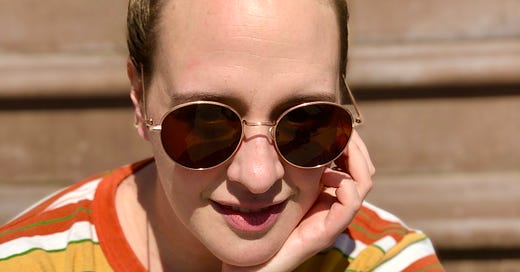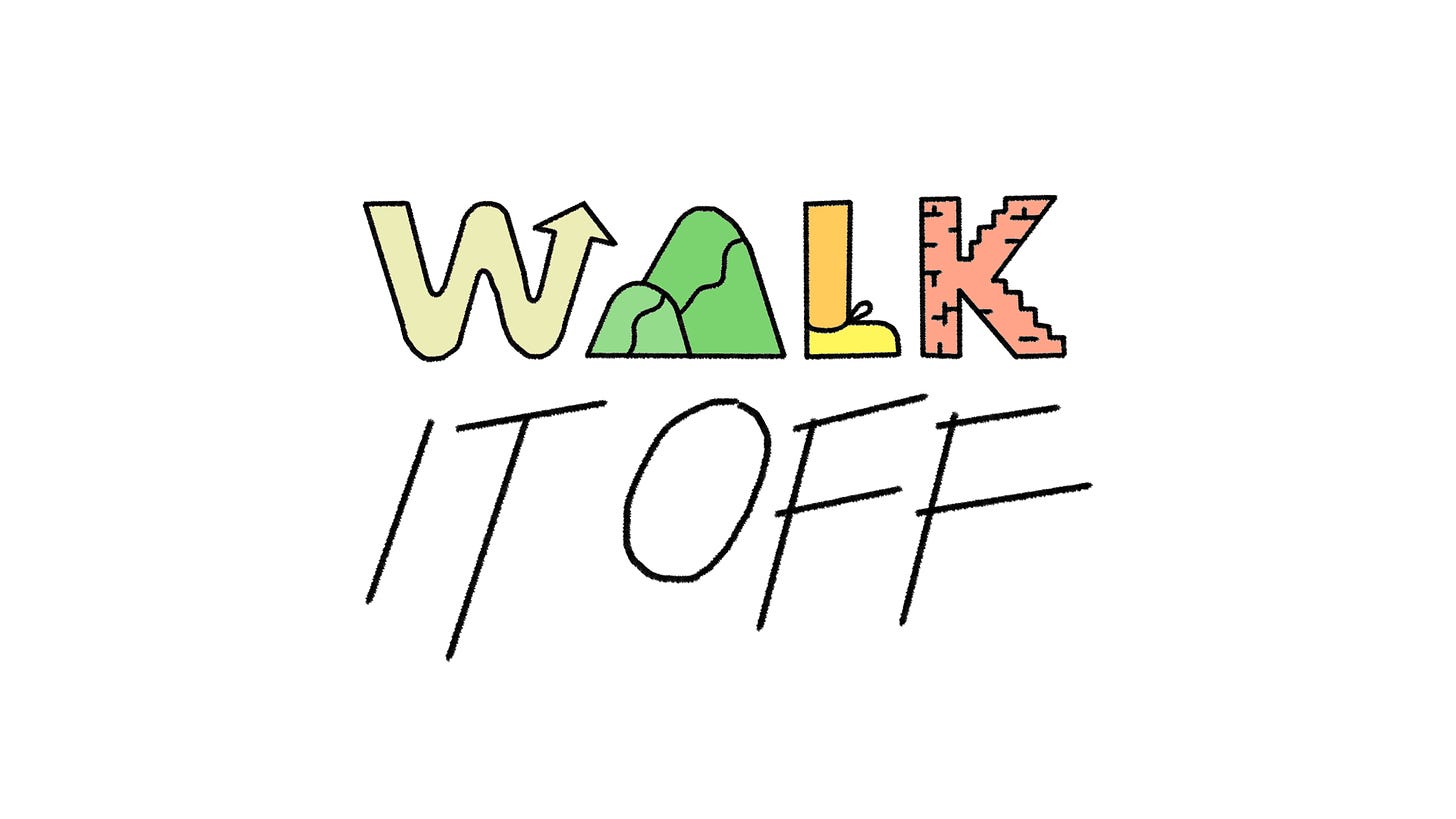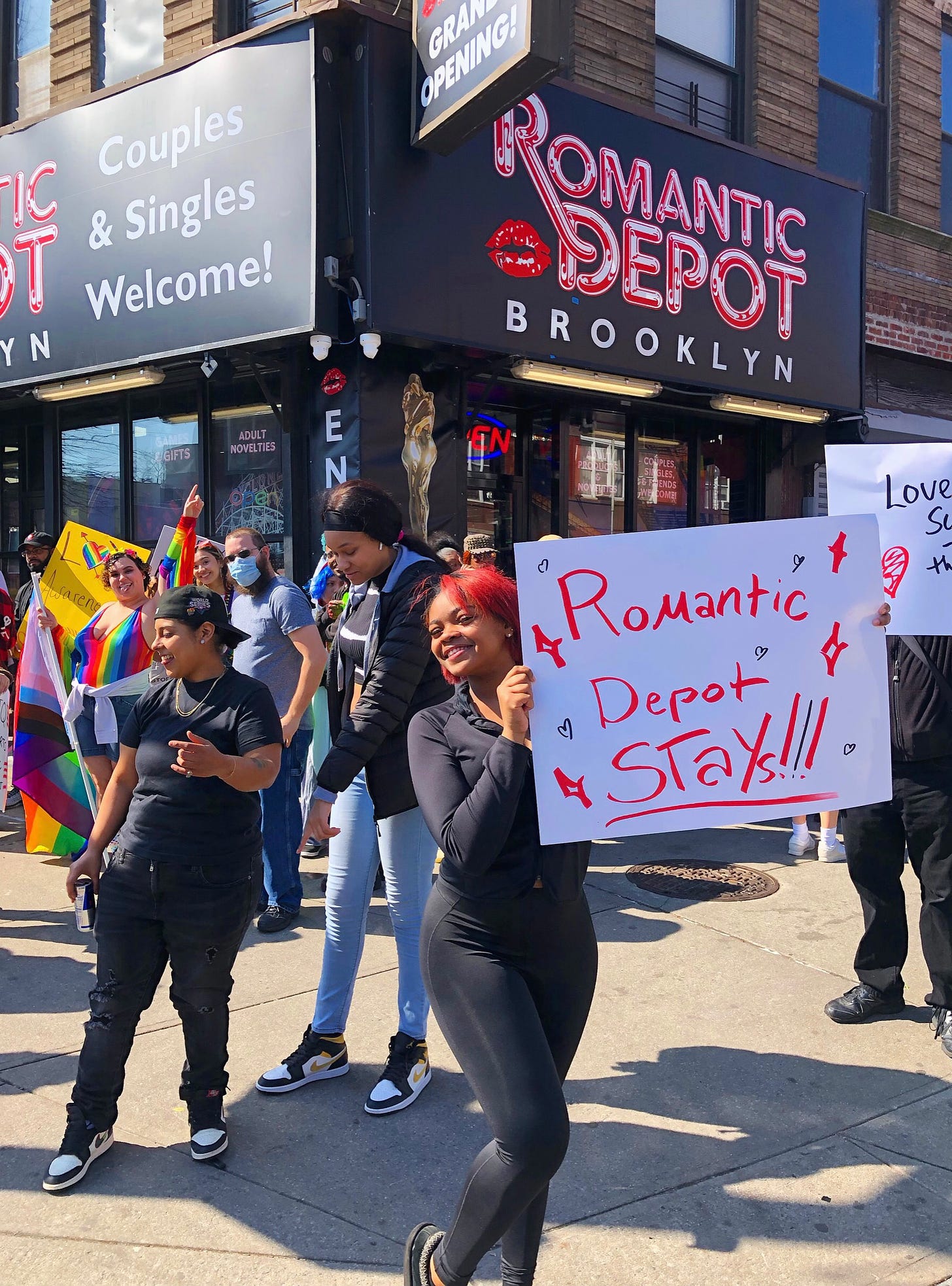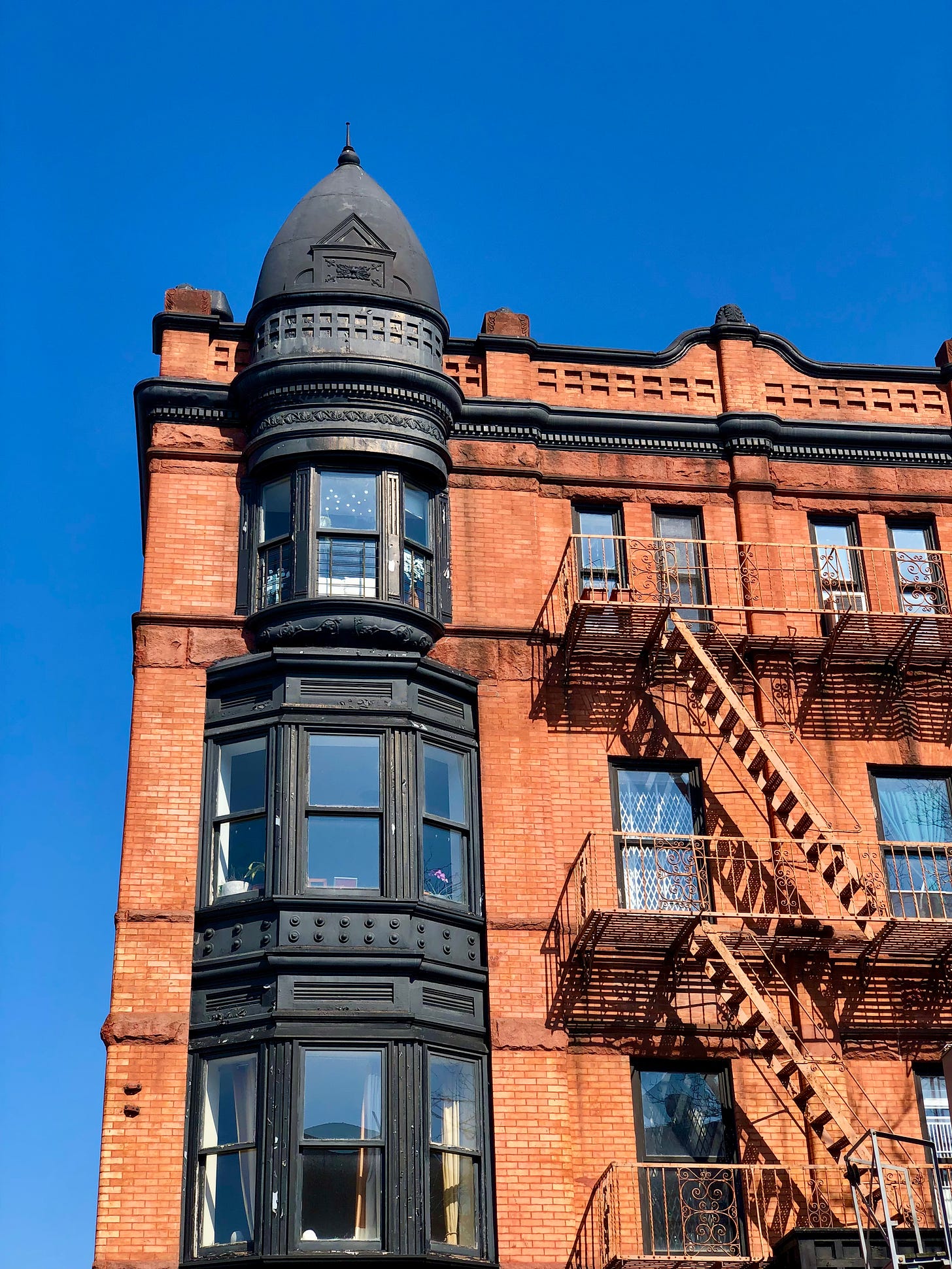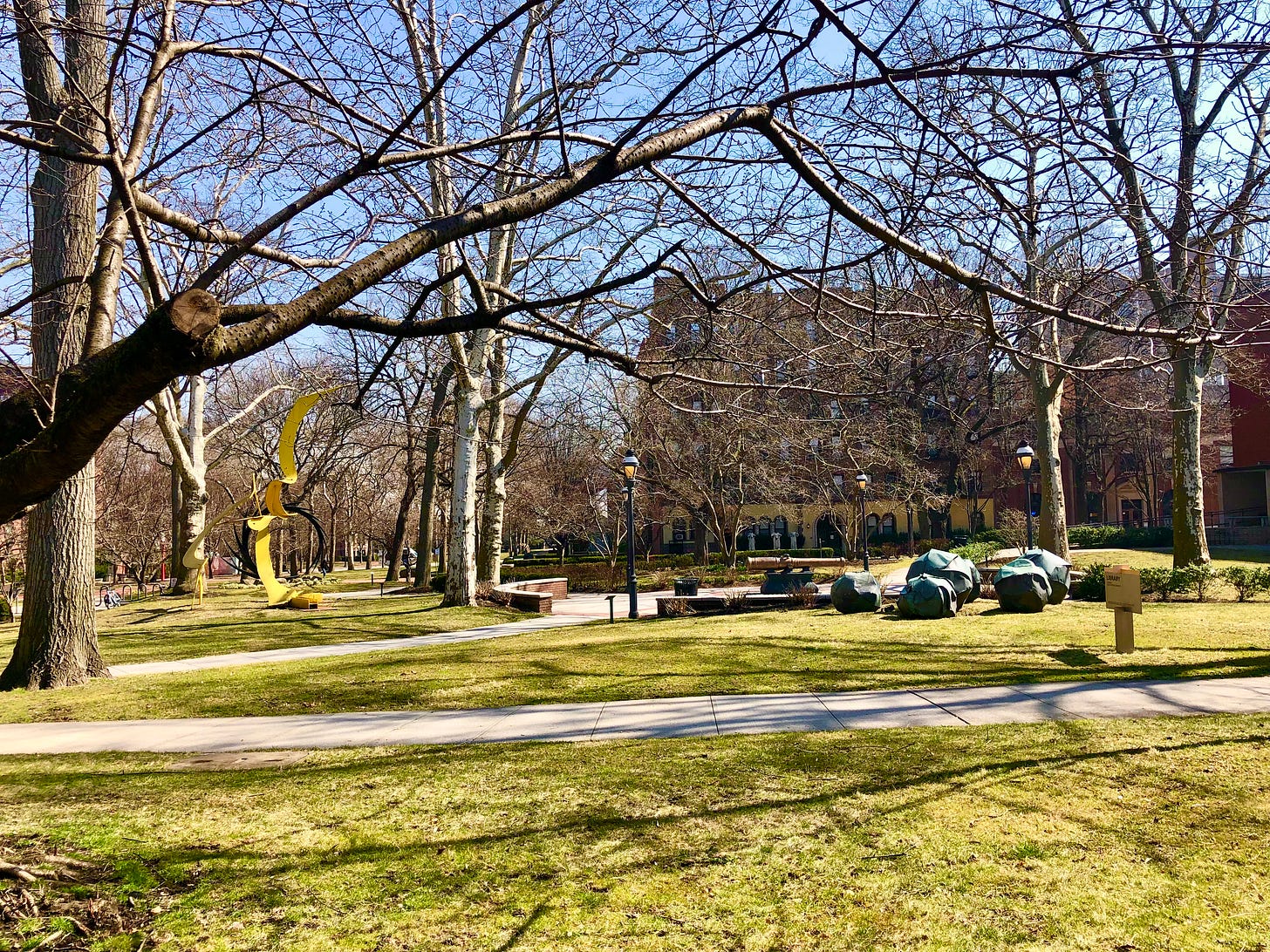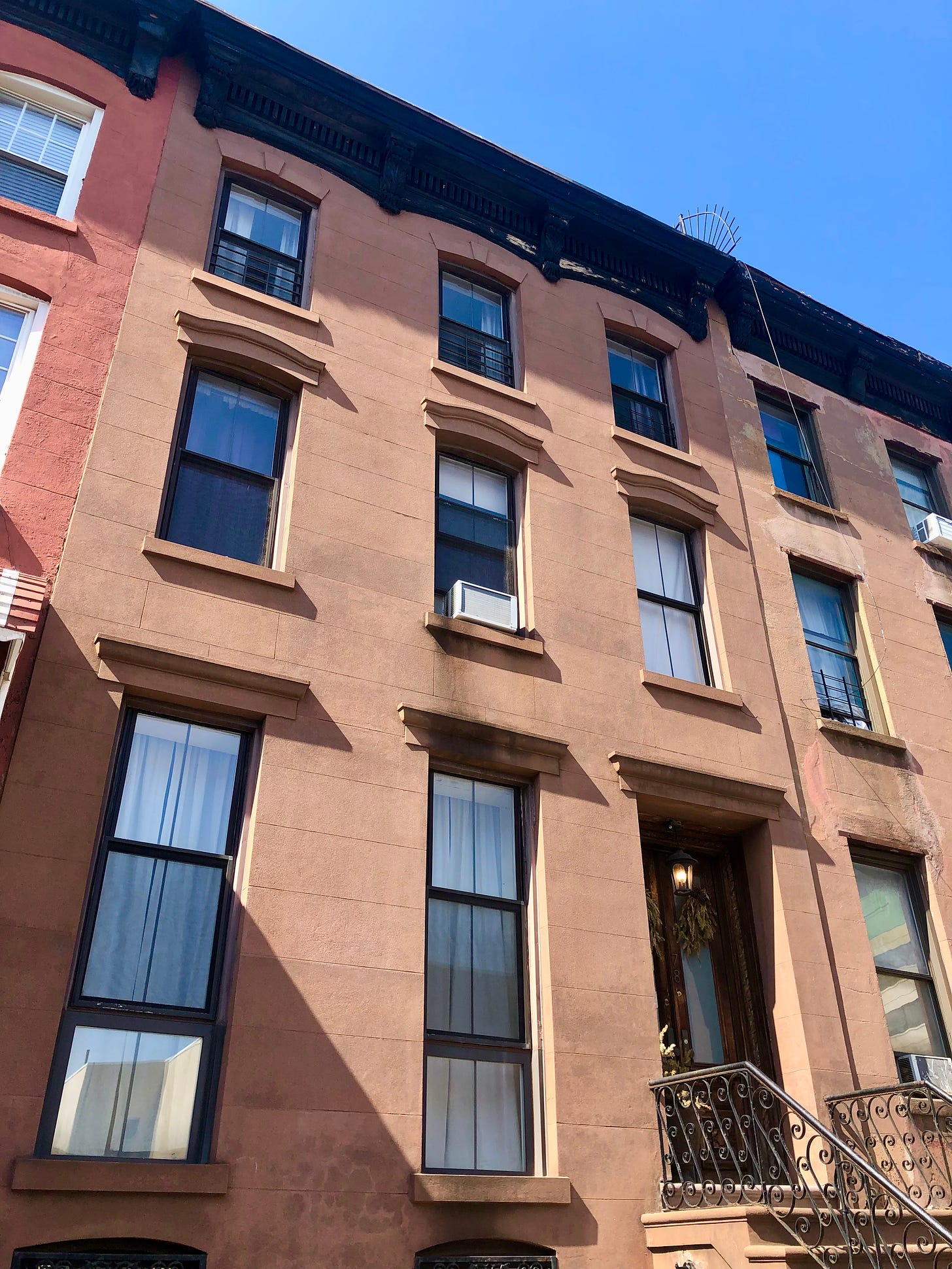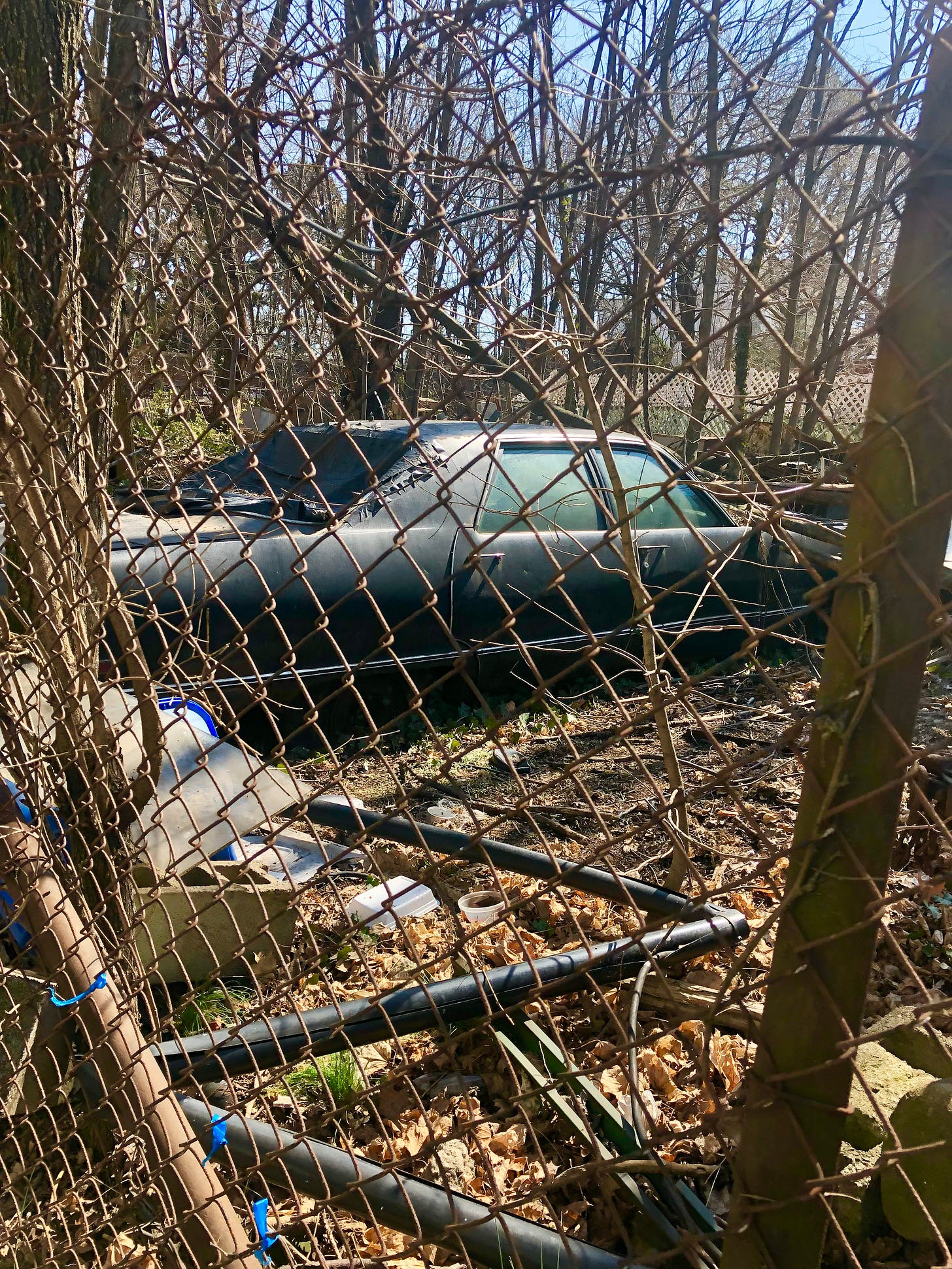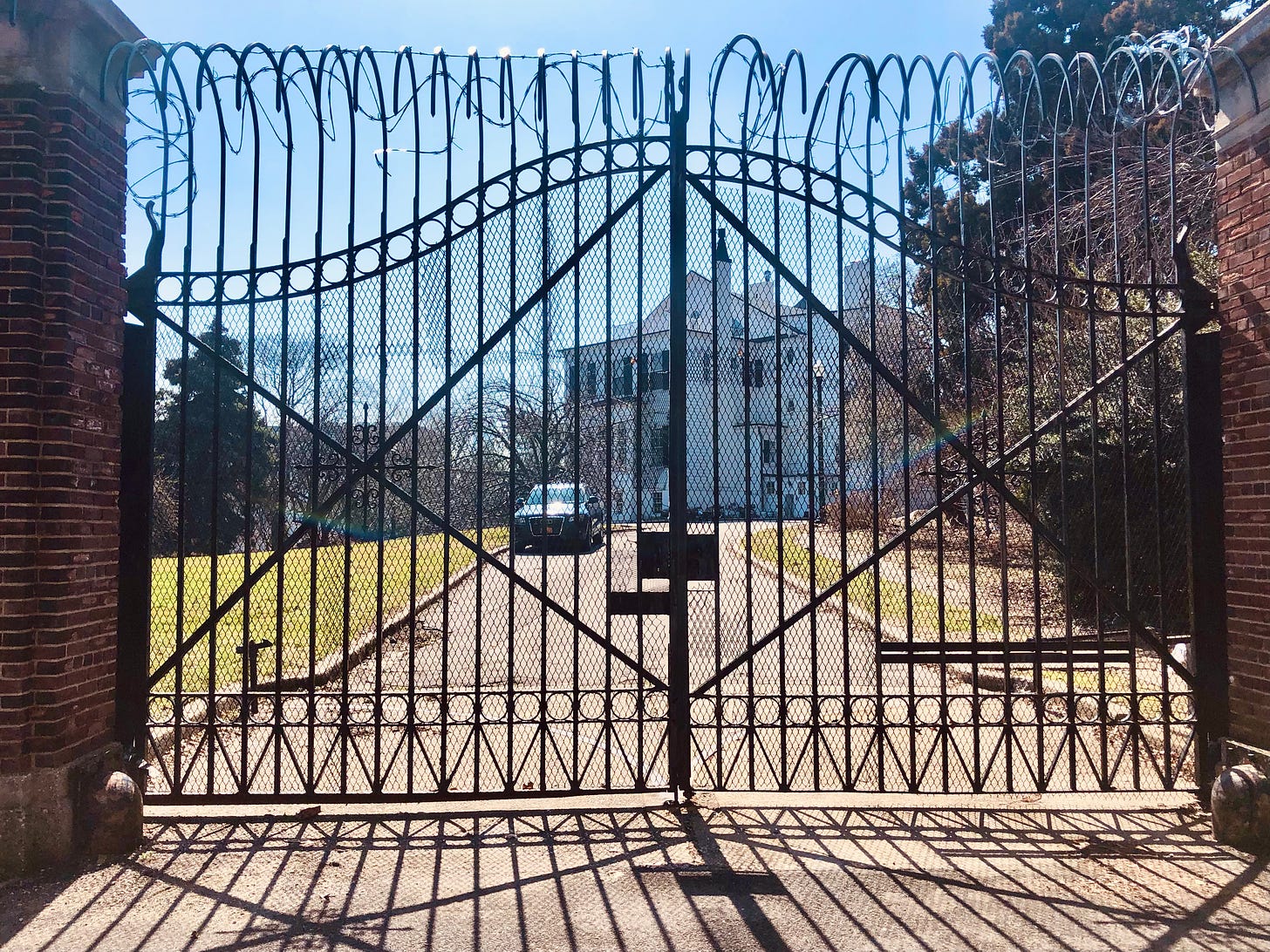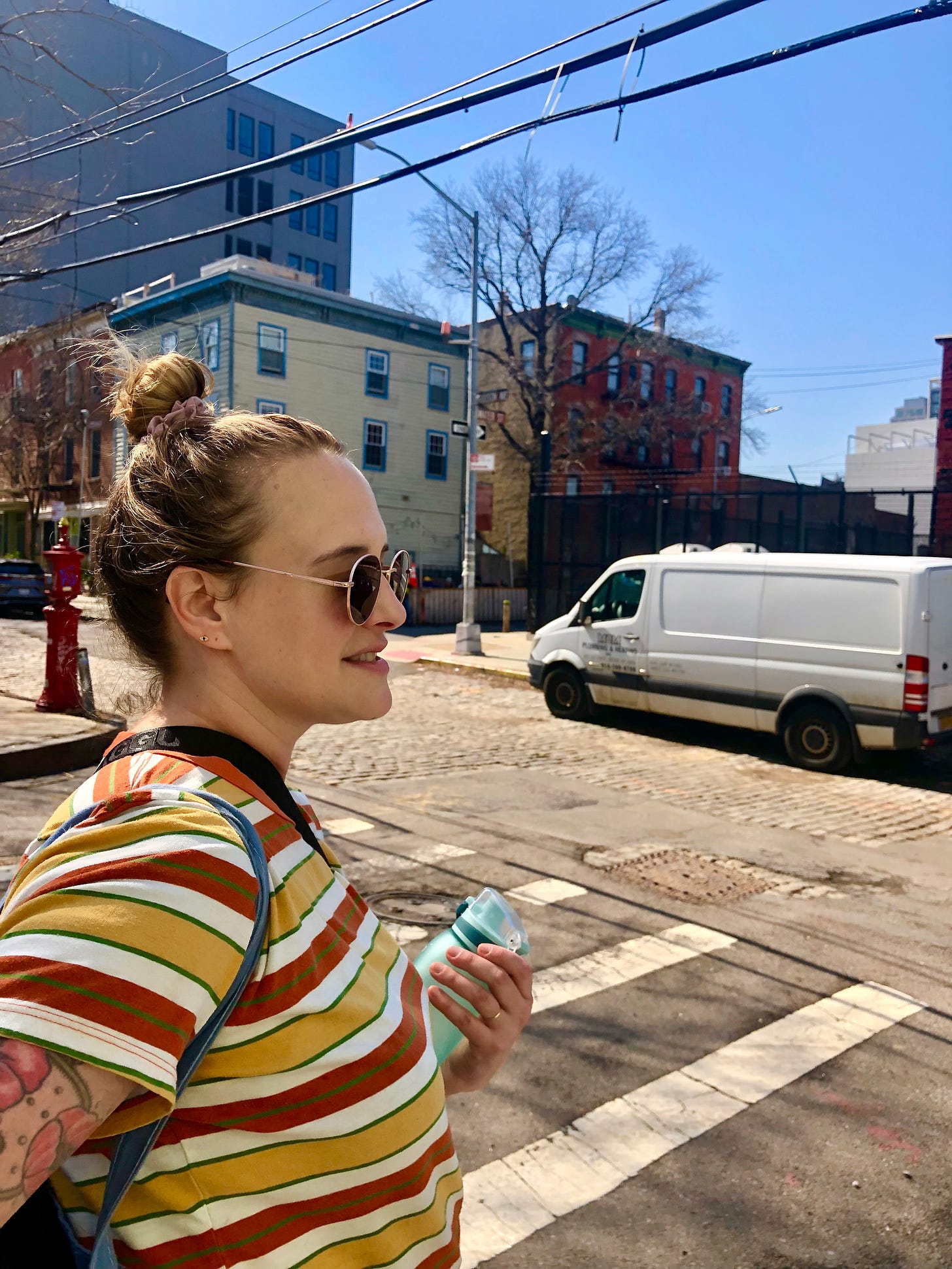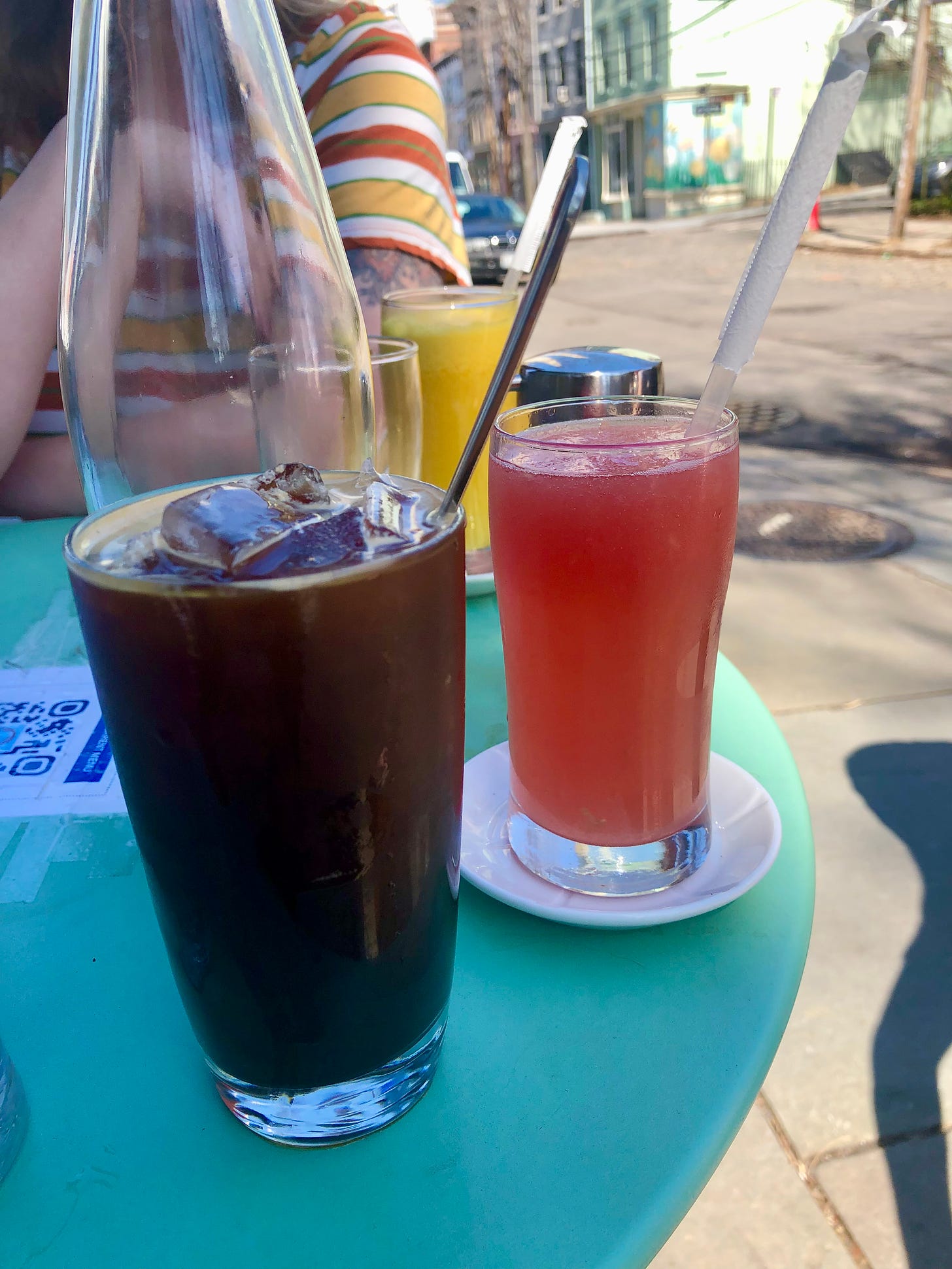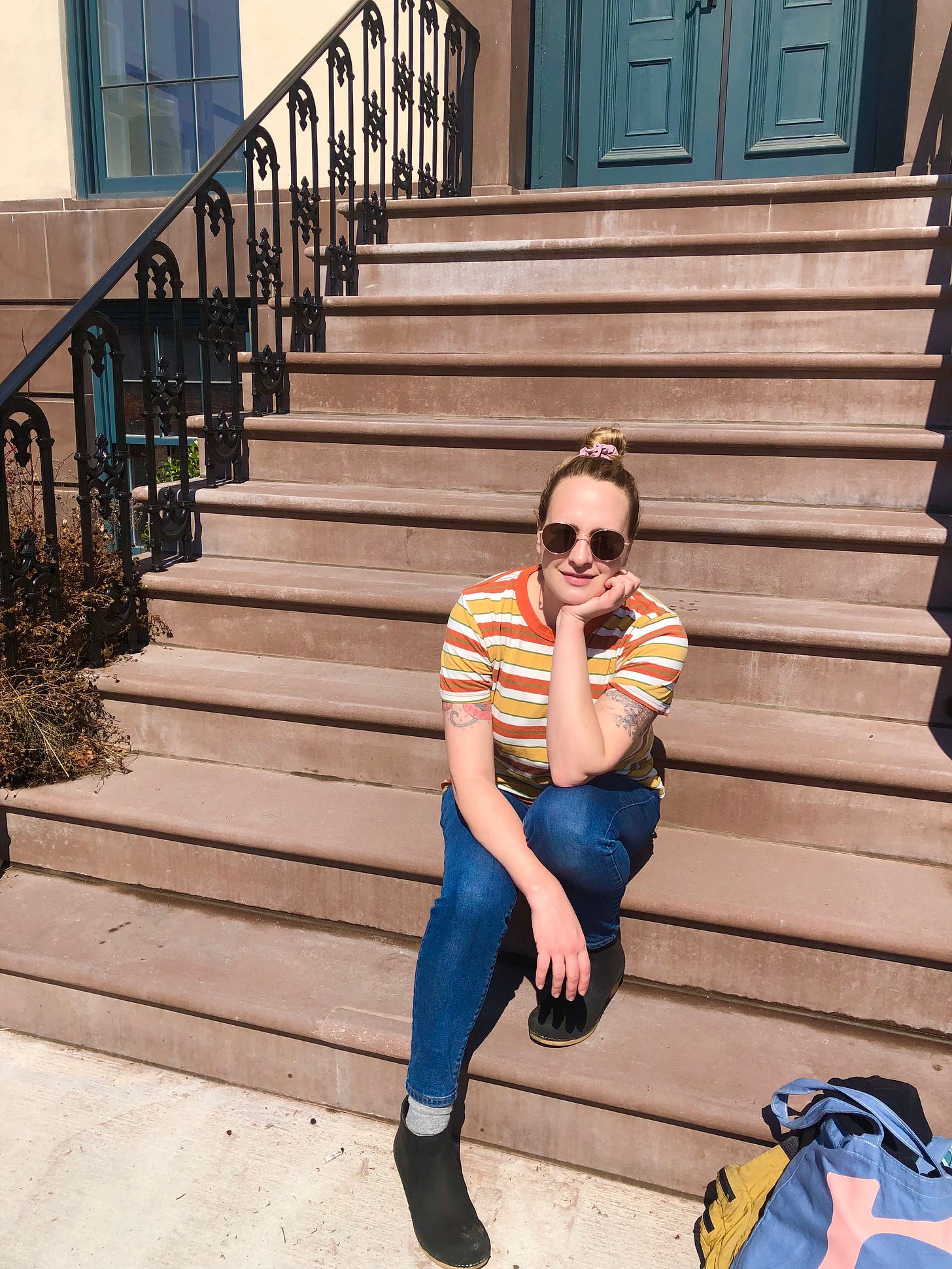A Walk to Vinegar Hill with Emily Gould
"This is beautiful to me. I don't need palm trees. I'm very happy with a rotten banana, a pile of dog shit, and a used condom being my scenery."
“Are you with us?!”
A woman holding a placard that reads “Romantic Depot Stays” is shouting at me as I walk down Washington Avenue. She is standing in front of a storefront, under a more permanent sign—“Romantic Depot: Grand Opening!”—and is surrounded by a crowd of people waving rainbow flags and cheering. When it comes to sex shops, I consider myself for ‘em. So I pump my fist in the air. The cheering grows louder.
As I pass the pro-sex-shop-placard-holding-protester, I ask if I can snap her photo. She agrees.
I’m walking through Clinton Hill, on my way to meet Emily Gould. I don’t know it yet, but real estate will very much play a role in both our conversation and our walk. Expensive rent, who gets to live where, a secret mansion, and neighborhoods that feel like forever homes, even when we can’t afford them. When Emily welcomes me into her apartment, before we head back out into the gorgeous spring day, one of the first things she says is, “All I want is for my family to be able to stay here.”
Isaac: Why do we live in this expensive city?
Emily Gould: Increasingly, I have no idea. It feels as if I trapped myself in this life. It's become clear to me over the past few weeks that what we—my husband and I—should have done was move somewhere way cheaper before the kids started school. Because now they have this whole life here. They have friends, and we have friends who are the parents of their friends. We have this whole neighborhood scene, which is really heartbreaking to think about abandoning. I know it's not the worst tragedy happening in the world right now, but every day when I drop Raffi off at school—which is five blocks from here, I just…
I’m a sociable person in the right context, but I never thought pre-9am would be one of those contexts. Not until we moved here. To this exact location. Now, when I drop Raffi off—I swear to God, every morning I think about that opening song in Beauty and the Beast. Belle is singing, “There goes the baker with his tray like always.” That's literally how I enter the day every day. But unlike Belle, I do not want more than this provincial life. My feeling is, “This provincial life is the shit, and all I want to do is maintain it.” But it's getting harder and harder to tread water without being a corporate lawyer or an investment banker. I think one of the most frustrating things for so many people about being a writer—and it drives people literally off the deep end—is that, it's simply a fucking lottery, you know?
I: “It’s like Lotto, you’ve got to be in it to win it.”
EG: But why be in it at all? There are people who are good at the careerist piece of it. Then there are people who are good at the writing piece of it. A small percentage of people are good at both. But most people are only good at the careerist piece of it or only good at the writing piece of it. Then, on top of all that, you have to factor in luck and chance. You simply don't have much control over any of it. All you can do is set up your life to be as small and sustainable as it can be, but that's never been—
I: That’s not the dream.
EG: Well, that's what I would have done if I was a totally different human being. I would have taken the money from my first book and said, “I'm going to marshal these resources wisely.” I would have gotten a job, and somehow written the book while also having a full time job. And instead of paying rent to live by myself for the first and only time in my entire life, I would have bought the smallest, shittiest studio imaginable. Then, once its value had doubled—as the value of all New York real estate has, if not tripled or quadrupled—I would have sold it and had somewhere to live with my family. I would have bought a place that I would never be able to be kicked out of. But all of that would've required me to have been a completely different human being. So, you know, my therapist discourages me from going down that path mentally.
I: It’s a good point, though. If you did all of that then you wouldn’t be you.
EG: You know that prompt your phone or your computer gives you sometimes? When you sign into a website and it says, “Continue as Emily Gould?”
I: Yeah, of course.
EG: Sometimes I have moments where I stop and think, “What are my other options?”
I: “Show me, computer. Can I just take a peek?”
EG: It sucks. There are a lot of good things about who I actually am, but then there are these totally separate things—my resume, for example—it would be cool to be able to just opt out of them temporarily. I'm not talking about faking my own death and moving to a new city or anything, or Lost Daughter-ing my life. But the idea of saying, “Hey, I'm Alicia Goldfarb and I'm showing up to interview for this content marketing job.” To have all of the actual skills that I have, but none of the baggage that's associated with me. To say, “Hire me,” and then do some sort of mid-level, menial task—
I: For six figures.
EG: Yeah.
I: Let me buy a goddamn apartment.
EG: Exactly.
I: What brought you to New York in the first place?
EG: It’s funny, because I'm sort of steering us in the direction of my old apartment that I lived in when I was single—before I had kids and when I was living off my book advance and starting to write Friendship. From there I thought we could walk up Flushing Avenue for a bit, past the Brooklyn Navy Yard, and then head into Vinegar Hill.
I: I love that.
EG: The only thing is that the walk culminates in DUMBO. But we can circumnavigate that, because DUMBO is horrible.
I: What’s this over here?
EG: This is Pratt. I wish I could take you inside, but pandemic rules—they started checking IDs at the gate. Up until 2020, though, you could get a community membership to the Pratt library. It was $125 a year, and—especially in the summer, when the students aren’t around—it's the most idyllic, beautiful, perfect place to write and work.
Pratt is the first place I lived in New York because I went to an art camp at Pratt when I was 15.
I: Really?
EG: In 1996. I have no idea why my parents let me do that, in hindsight. It was so obviously a terrible idea. Supervision was, shall we say, lax. I got a MetroCard and said, “I'm going exploring,” and they were like, “Sure.” I was doing something similar to what you’re doing now, actually. I figured, “I'm going to explore New York by simply riding the subway and getting off at random stops—I’m going to walk around and see what's out there.”
Which, for a 15-year-old who is from the suburbs of DC was sort of—but you know what? I didn't die. Everything worked out. Sure, there was one moment where I smoked weed for the first time on the roof of some building, and sure I had climbed up to the roof from the fire escape and then had to climb back down high as hell, which was a struggle. Did I think I might fall? Yes. But I was mostly worried about how embarrassing it would be for everyone involved if I were to die in such a stupid way.
I: That’s a very good 15-year-old thought, “Oh no, my death is going to make everyone so uncomfortable.”
EG: “My death will be cringe.” But overall, it was obviously such a magical experience—not just the roof and the weed, but exploring the city and the time in New York—so I fell in love with the city and was totally sure that I was going to grow up and live here. Which, I did—and I basically have not left. I lived in the East Village when I first moved to New York. Then I lived in extreme Greenpoint—basically Bushwick. But eventually I landed back here, literally a block away from Pratt. I’ve been in this area ever since.
I: So, this has always been the center—even when you haven't lived here. This is your New York center.
EG: The Pratt library is a magnet. Maybe there's a ley line or some sort of cosmic energy that attracts me to exactly this spot.
I: So—despite everything—New York is home?
EG: Yeah. I keep trying to make it work. I always feel as if, “I have to try one last thing here.” One last attempt to stay.
I: But you’re open to moving?
EG: Fucked up and desperate enough to move, you mean? I don't know. We’d have to move somewhere we have friends. Another way to put it, am I always visiting other cities and hoping to fall in love? Yes. I've even been working on learning how to drive, which would really open up my life in terms of living literally anywhere else in America.
I was in Los Angeles last week—staying in Venice—and I ended up accidentally walking seven miles a day. It was so great. I loved it. I had such a great time, but after three days my feeling was, “I'm good.” Because I missed this.
[Editor’s note: At this point Emily gestures at a pile of garbage on the sidewalk. I fail to take a picture.]
This is beautiful to me. I don't need palm trees. I'm very happy with a rotten banana, a pile of dog shit, and a used condom being my scenery.
I: That hits you in your heart. That feels like home.
EG: Whereas, if things are too nice—which they routinely are in LA—I get very uncomfortable. I feel that way in Portland, too. I'll be sort of coasting along, feeling very happy and carefree—receptive to the idea that I could continue living there for a while. Then on day five or six, I'll have a panic attack out of nowhere. I really think it's because my whole central nervous system is used to—how best to put it?
[Editor’s note: At this point a giant truck hauls ass through a yellow light and almost hits us.]
Well, that. The fact that you can get hit by a truck out of nowhere. “Oh, watch out. What's that guy doing? Is that car going to hit me?” If I don't have that low level, constant threat level, my whole brain and body starts wondering, “What do we do now?”
I: “Where's the conflict?” I find that, well, worrisome. But also charming and lovely, in a way?
EG: Charming and lovely or mentally ill, who’s to say? What I should really do is get a lot of acupuncture and learn how to live in a city where not every loud noise might mean that someone's trying to murder you.
Also, learning to drive in New York is… a choice. “If you can make it here, you can make it anywhere.” But, can I make it here? I'm really not sure.
Driving in New York you're constantly in these situations where you really have to say, “Your options are, you can hit me or you can go around me.” I never want to be in that situation. I don't want to put anyone else that situation. Whereas, driving in other places, people simply go, “It’s fine. We're going to be stuck in traffic for a while. Let's listen to a song on the radio.”
I: So this is your old apartment?
EG: This is where I used to live when I was young and single. Carefree and miserable—but in a fun, romantic way.
I: This seems like a good place to bring up And The Heart Says Whatever, your essay collection from 2010 that—and correct me if I’m wrong—but people are still passing around, yeah?
EG: I'm surprised whenever I see a picture on social media of a young person reading that book or talking about that book. I always think, “I don't even want to know what young people are making of this.” It must seem like a relic from a totally different time.
I: Over a decade ago now. Are you one of those writers who says, “I don't even remember what's in there?”
EG: I didn't go back to it for years, because I was sort of embarrassed of it—especially because the initial reaction to it was so bad.
I: Was it?
EG: Oh yeah. It was horrible. I didn't write essays again for a long time after that collection. To be honest, the reason I started writing fiction is because I felt… “Well.”
I: Really?
EG: It was really dark. It was simply a different time in the culture. I mean, some variations of this sort of reviewing still happens, but it was really, really commonplace back then for someone to write a review that basically said, “This woman is doing nothing more than writing about her life. She's not really saying anything.”
I: “What gives her the right to publish a book?”
EG: “Nothing interesting has happened to her. She's simply describing her experiences.” To which my response was, “Yeah. So?”
I: “It's called the writing, dickheads.”
EG: Well, some people have a combination of genuinely fascinating shit that's happened to them plus the ability to make sense of it—and they can then convey that sense that they've made of it to an audience. But that's a rare, rare combo.
I wasn't ever setting out to say, “Here are the momentous historical things that I have witnessed and experienced.” I was more saying, “Here's what life has been like for me, a pretty ordinary person who's decent at describing things.”
I: I would say way beyond decent.
EG: You’re sweet. But yeah, when And The Heart Says Whatever came out it was rough.
Of course, the collection is not everyone's cup of tea. Which is fine. That is fine. But what's not fine is when people are saying, “Oh, this isn't art,” or, “This isn't what memoir should do,” or, “That's not what memoir is for.” People who say, “Memoir is when you've had a historic event happen with your participation,” or, “You've had a long life."
I: “You're supposed to be 80 years old before you have any right to write about your own experiences.”
EG: Plus there's something very—the way that the genre of essay writing was sort of feminized when it became perceived as something that mostly only women did. Which automatically meant that it was unserious. Not literature, you know? So then I really over-corrected—or, I don't know what I did, if I’m being honest—but I did only write fiction for a while. Then I channeled my love of first person writing into publishing other people's first person writing, which allowed me to sort of live vicariously through them. In exchange, I took on some of their—I was hoping to sort of be a human shield, in a way.
I: Oh wow. That’s fascinating. We’re talking about Emily Books, now.
EG: I don’t think any writer should have to experience what I've experienced. But some of it is inevitable, so I figured a publisher who's sensitive to that can at least do some sort of damage control and aftercare. Not put you in positions where you're going to have ritualistically subject yourself to badness.
I: I wasn’t aware of this. I of course know that there are moments in your career where sexism is front and center, but I didn’t know And The Heart Says Whatever received that reaction. Do you feel a little vindicated that the collection is still around, while a lot of books from that era—maybe even books by the very people who were dressing you down, so to speak—are not?
EG: I'll feel vindicated when the 20th anniversary edition of it is republished and everyone who wrote a review of it has to write an exculpatory essay that's core argument is, “I was wrong.”
I: And even then?
EG: Even then. Probably can't undo it. But, in a way I'm glad. It sent me on the trajectory of working with other people's essays and other people's memoirs. I don't know if I would've gotten there if I hadn't had that radicalizing experience of being subjected to so much sexist criticism.
I haven't thought about any of this for so long.
I: I apologize.
EG: No, it's fine. It really is fine now, but it does make me very wary of going back into that mode—of writing about my life. I've only felt safe doing it more recently, because I've been able to speak to an audience and people who are already familiar with my whole deal. You get into trouble—I'm sure you've experienced this, as someone who has ever been online—but the times you get into trouble are when you sort of presume that your audience is friendly and receptive, that they're going to pick up what you're putting down, and then your dumb tweet—or even your heartfelt, well-thought-out essay—finds its way to the wrong side the Internet, and suddenly people are—
I: Destroying you as a human being for something you wrote.
EG: Which I can deal with, but when people come for my kids? Or my parenting? I really don't have thick skin about that stuff at all.
I: I do want to touch on Emily Books—the idea of ushering other people's essays and writing into the world, as you were just saying. You and Ruth Curry published so many incredible books. Problems. Temporary, which—in 2020—I believe was the last book y’all published. Is that because you want to refocus on your own writing, or is there a world where you would go back to helping other people publish?
EG: I've been really enjoying not having any professional role in the publishing industry.
I: Hell yeah.
EG: Other than, maybe someone will publish another book that I write, someday. But this time outside of publishing has been a sort of detox for me. I have a really different relationship with reading now than I used to. It's such a relief, never to be reading evaluatively. I understand why most people read books in the way that I really didn't before.
I: Or had forgotten. Reading like a kid again.
EG: Nine-year-old me used to go to the library and check out every single book in the section, so maybe not quite that. But yes. It’s been really great to change my relationship to reading. I would be loathe to fuck with that. But I do really care about books. I can't stop thinking about them and having opinions about them.
To answer your question, I don't know if the story of me being a publisher—in some way, shape, or form—is totally over, yet. But I definitely think I'm going to take a long, long hiatus and fully reset what I need books to be in my life.
Emily Books was never something that I made money from. It was always this sort of vexed thing where I might be about to maybe start making money from publishing. So I would keep at it, but that kept me trapped in this sort of shadow economy of favor exchanges that I don't—let’s just say I’ve really been relishing not being a part of that anymore.
I: The sort of ‘shaking hands and kissing babies’ part of publishing.
EG: Not wanting to piss off someone who you really don't like, because who knows, they might be the person who makes a difference? I don’t mean for me—I don’t give a shit—but for one of my authors? I don't have to do that anymore, and that feels really, really good. Plus, I was always terrible at it anyways. I would always fuck it up. So, it's a relief to not have to be political, or not being political but—
I: It’s a relief to not be constantly failing at being political.
EG: Always trying so hard to shut the fuck up. The hardest part of having any job for me always is the part where you can't yell at your boss. Or say the wrong thing in the company-wide Slack. That's where I always seem to find my way headed out the door.
I: Well, another way to put it is you shine when it comes to speaking truth to power.
EG: More like I shine really brightly at a company for about three months and then put my foot in it.
I: I do find this fascinating though. The idea of your relationship with reading changing. I felt that too, having gotten out of talking about books on the Internet for the most part, now.
EG: Isaac. You recommend books on The Today Show.
IF: Touché. Fair point, fair point. But even that feels less constant than, say, when I was at BuzzFeed Books. But no, you’re right. I’m not out of the game. What I’m talking about, though, is I can relate to your relationship with reading changing. I remember walking into a bookstore after I'd stepped away from BuzzFeed and having this sense of, “Oh, I can buy something that's not forthcoming. I can read something I’ve always been meaning to read. I have the time to pick up a book from 1983.”
[Editor’s note: The book was Angels by Denis Johnson.]
EG: But see, that’s what drags me back towards it. Because I'll read a book from 1930 and say, “No one knows about this book. I'm going to be the one. I'm going to tell everyone.”
I: “I'm going to be the person who puts a spotlight on this book.”
EG: Yes.
[Editor’s note: Damn, she got me again.]
I: Do you remember what book you were reading when you had that feeling of, “Oh wait, I'm reading this differently than I used to”—do you remember when that moment happened?
EG: I didn’t read novels all of 2020. My brain was not functioning in a way that allowed me to have an imaginative life. It was a real time of crisis for me because my kids were so little, and all I could do was sort of get through the days. I didn't make memories during that time. I mean, there are a few specific things that I remember from the summer of 2020 that I know about because they happened in the larger world, but in terms of my own day-to-day life and experiences? It's all a bit Eternal Sunshine, you know? To be honest, I'm grateful for that.
I: You were in survival mode.
EG: We all were. But when I came back to reading books I told myself, “I'm going to only read things that are purely pleasurable. That don't have anything in them I could—in any way—feel competitive with.” So no contemporary books. No books that are similar to any of the writing I do—or the writing I may one day want to do. I was strictly reading plot heavy, or even fantastical novels. I started reading science fiction for the first time—'70s feminist science fiction. To use the analogy we mentioned earlier, I was going to the library and seeing the button that read, “Continue as Emily Gould?” and replying, “No, I’d rather not.” Instead I started picking up books I’d never thought to read before.
I: I love that you're reading '70s feminist science fiction.
EG: But again, then I get a feeling of, “Oh no, if only someone had an imprint where they can reissue these. Or publish similar writing.” And I have to tell myself, “No.”
I: You’re stepping back from that.
EG: Somebody could do that.
I: But not you?
EG: But not me. Oh, I wanted to take you up this way. I don't think anyone's going to stop us.
I: Holy shit, what is this place?
EG: It's a house. This is a private residence. Somebody fucking lives here.
I: Holy shit.
EG: It’s the Commandant's House. It was built in the 1800s as place for the commandant of the Brooklyn Navy Yard to live. I’ve seen pictures of the interior that were taken around 1920. It's real Gilded Age in there.
I: And it’s simply hiding here? Behind that abandoned lot that’s basically a junkyard—which is what I thought you were trying to show me at first.
EG: I do also love the junkyards.
I: I mean, same. But this is amazing.
EG: The whole Vinegar Hill area reminds me of Baltimore, in a way.
I: I can see that.
EG: There's a shipyard. These houses were built for people who were dock workers and sailors and captains. Also it's a style of architecture that you really don't see many other places down by the water.
The sad thing is, most of these homes aren’t historically protected. They're all going to get knocked down and turned into—
I: Giant, glass high-rises. Shit. All these buildings are so beautiful, not simply the Commandant's House. This is such a distinct area, and I’d much rather have these buildings than some sky-licking monstrosity. That sucks.
EG: Red Hook is also a bit like this.
The other reason that I took you this way is that there's a scene in Friendship where Amy is working in DUMBO. She quits her job, and—in a manic spree of feeling as if she's making a lot of bad decisions really fast—she runs from her office in DUMBO and takes the route we just walked—
I: Past the Navy Yard. I remember the scene.
EG: While she’s running she passes a Buddhist temple—a temple that’s really there—and runs up the stairs and has this dumb thought. She’s hoping she can throw herself into a life of solitude. Simply get away from it all. But the temple door is locked.
I: So she keeps running.
I: I wanted to ask you about this ‘90s and Aughts revival we’re going through right now. You moved to New York in the early 2000s. You write about these time periods in both your fiction and your nonfiction. How do you feel about the nostalgia for that era that's happening right now? Do you care?
EG: The heralded return of indie sleaze, you mean?
Well, for a hot minute during the pandemic, when I couldn't work on fiction because it was too hermetic—a quarantine state within a quarantine state—I was writing a screenplay with a co-writer who actually knows how to write screenplays. We were trying to do a TV pilot version of some of the material from my And The Heart Says Whatever era.
I: Whoa.
EG: I was hopeful for renewed interest. Hopeful for all the redeeming of the scorned women of the ‘90s. So I was thinking, “Oh, this is perfect timing because this stuff is bubbling up in the culture again. We'll be able to sell this pilot because people suddenly have a renewed interest in—or awareness of—2006.”
But then, I don't know. I think we both lost steam a bit. Now, you never know how these projects might come back around in the future. But right now I have this feeling of, “Been there, done that.” I reread some of the essays from the book recently, simply to fact check my own memories. So I do think there's stuff from that time that I'll always be thinking about and always be writing about. It’s definitely part of my path forward, but maybe not in such a direct, “this is what happened” way.
I: So it’s more about how that time period ripples through the rest of your life?
EG: I don't know. I feel like I haven't really integrated the past seven years of my life yet. I still feel it's chunk of time that I'm trying to figure out how to get enough distance on, so that I can look back on it and observe it.
I: I would argue a piece you did just that extremely well with was your New York Magazine Jimmy Kimmel essay, “Replaying My Shame.”
EG: It’s funny you should bring that up, because I was thinking about that essay recently. That published in February 2020. It was an essay I’d been working on for six months. I had enormous feelings—some bad, some good—around that piece. Then, a week later—
I: The whole world shifted.
EG: Yeah.
I: Wow. So that was a moment—a big moment—and then all of a sudden, it's gone.
EG: The way things have worked out for me in my career—I've never had the experience of publishing a book and having that be a happy time in my life. A time where I felt a sense of achievement or recognition or that publishing the book was a good thing.
I: Fucking hell, Emily.
EG: I still hold out hope that at some point, it will happen for me. One of the shitty things about having Perfect Tunes come out in April of 2020 was that I was saying to myself, “This is going to be the one that doesn't get ruined somehow.”
I: And then—
EG: And then. At least it wasn’t about me or the book this time.
I: More a global pandemic with un petit social collapse.
EG: Don’t worry, I still figured out a way to take it personally.
I: All jokes aside, and apologies if I’m overstepping here, but historically speaking, it does feel like people get irrationally mad at you. Is that—
EG: I don't actually have a lot of insight into why that is. I've definitely been in the wrong place at the wrong time and caught some flack that maybe didn’t have anything to do with me, the human being, or me, the writer. That being said, I can be pretty outspoken and annoying and I haven't done a great job of strategically making friends with the right people. And I'm not—
I: But that's a good thing.
EG: Is it? I'm not trying to say, “Oh, I'm a brave iconoclast.” I'm simply not good at that. Whereas some people are, and I admire them for it. For example, Keith.
[Editor’s note: Keith Gessen, Emily’s husband.]
I admire the way that Keith moves through the world. He's not trying to kiss anyone's ass—now, it should be said, the bar is set so much lower for a man. If you’re a man who can string two sentences together, people will say, “Oh, he's so extroverted and sociable.” But Keith doesn’t kiss anyone’s ass, yet he still moves through the world with ease. When it comes to that sort of thing for me, though? I was dealt a bad hand. To be fair, I then probably played into that hand and made it way worse in a whole bunch of ways.
The other thing though, is that I'm 40. A lot of people who are 40—especially men—are only just now starting their novels. Plus, a ton of writers of every gender who I admire have had a number of great things happen to them in the middle and later parts of their careers. So right now, when I want to get really sad about the way things have played out for me, it's very easy for me to get to a self-pitying place of, “I tried all these things and they didn't hit.”
The thing about Emily Books that I wish that I had understood at the beginning is that if you are not in the exact center of the culture, you can't invite people closer to the center. If Reese Witherspoon is in this middle ring and then Emma Roberts is in the ring outside of that, I'm in a ring many, many rings outside of that ring. And I was trying to take people who are a little further outside of my ring and saying to them, “Come closer, come closer to the center.” And that doesn't work. You have to be reaching out from way in there—way at the center. It seems so simple now, “Oh, it's totally obvious,” but it really wasn't obvious to me. In part because I thought I was closer to that white hot center than I ever actually got. But now that I know—I really know, I think—where I stand in this world. I know what is available to me and what outcomes for other people I actually can affect and what it takes to move the needle.
I: Which is an important knowledge to have.
EG: It gives me the freedom to say no to a lot of stuff. I really wish that I could give that experience to people who—I mean, but people have to figure it out for themselves, too. I think you do have to flail around and have the experience of saying, “Oh, sure. I'll write 500 words about my worst trauma for the blog of a women's magazine, because maybe that'll be the thing that makes the difference between my book being a bestseller or not.” And the fucked up thing about our industry is that it's obviously not going to be the difference. It's totally not. It’ll never happen.
Except for that one time that it does.
I: The lottery of it all.
EG: The lottery.
I: Ok, but—and I’m sorry, this is going to be a very Isaac Fitzgerald™️ thing to do—
EG: I'm hoping you’re about to pull out a flask.
I: No flask! Not today. Again, I think everything you’re saying is 100% true. But to repeat myself, Emily Books put out some really tremendous books, that meant a lot to a not small amount of people. Publishing is of course tough, and no, neither you nor I are Reese Witherspoon, but—well, I'm simply glad those books exist, I guess, is what I'm trying to say.
EG: I really am too. I think the great thing about books is that the life of a book is really long and unpredictable. I read this book recently that Sara Kramer from NYRB Classics recommended to me by this speculative fiction, fantasy writer named Lisa Tuttle, who, sadly—I think the only reason many people know she exists is that she dated George R.R. Martin for a hot second.
I: God damn it.
EG: They wrote a book together.
I: Have you read it?
EG: No.
I: Okay. Sorry. Keep going.
EG: I'm sure it's great. But no. Anyway, she wrote these creepy, almost Angela Carter-y books, that feel like a dark fairytale, but with that fine line between psychological realism and then—well, it might have some supernatural elements, or it could simply be a particular way that someone is losing their marbles. I love that. It had been so long since I had this experience, but you know the feeling of, “Oh, this book had to work really hard to end up in my life.”
I: Yes!
EG: It was published in an edition of maybe 500 copies by some small press. I had to buy it off of AbeBooks or something. Maybe Thriftbooks. It came from some dusty warehouse somewhere, and then it just spoke to me as though I had—it felt as if I had summoned it into existence somehow. It really felt like magic. It really felt like some little pathway was carved through the universe that led this book to me at that very moment.
We spend so much of our lives focussed on the ‘having a career’ part of all this. It’s very hard to reconcile the career part with the art part. I really wonder, as Marx did, what kind of art we would all be making if there was a universal basic income. I think we see little glimpses of it. Even countries that have socialized medicine put so much less pressure on authors and artists to churn shit out, because they can say, “Well, I can not churn shit out because if I fall down the stairs and get a concussion, it's not going to bankrupt my whole family and ruin my life.”
I: I would certainly take healthcare as well as UBI. But I also love what you’re saying about that Lisa Tuttle book. These magic moments, where the book exists on its own and finds the right reader. The author wrote the book, but then it becomes the reader’s book, in a way. Which I do think we’re seeing with And The Heart Says Whatever, over a decade later.
EG: Again, that’s sweet of you to say.
I: Are you working on anything currently?
EG: When it comes to writing, I've discovered that the only thing that works for me is to have intense binges of working on a book and then I'll put it down for long periods of time and then come back to it as a slightly different person. Then—and even then, only sometimes—I'll be able to figure out what the next piece of it is.
The book I'm working on now is going even more slowly than my first two books, which were also very slow. I feel competitive, it feels bad to be left by—you keep track of the people who had books come out around the same time that you did and you think, “How did she publish two books in the time that I've taken to write 30,000 words?” Especially because it’s not like I’m over here writing War and Peace. They're short books. They're formally not complex. They are mostly interior books about some characters doing life.
With my current book, I made the strategic error of starting the book in January of 2020. I kept saying, “I'll be able to fix it. I'll be able to either set it in some imaginary post-pandemic time that we don't live in yet, or I'll be able to set it at a historical moment that isn't this one.” But then everything that happened was so tied up in who the people in the book were, etc. So now I’m stuck with this—it’s a good beginning. I love the beginning. And I know where I’m headed at the end, but I don’t know at all how to get there. I mean, I know how. By working on it.
But for the moment I’m focused on making money, now that it’s possible to go out into the world and do freelance journalism again. Which I like doing. I’m profiling celebrities—it’s not going to Ukraine—but I like being out in the world and I like talking to people and I don't want to be just holed up, making imaginary people do things on my computer all the time.
I: As you said, “a quarantine state within a quarantine state.” Do you have any profiles coming up that you’re excited about?
EG: There’s one with Martha Wainwright. I simply wanted to talk to her. I love her music so much. She's been on my list of people who I wanted to profile for so long. She’s got a book coming out, Stories I Might Regret Telling You.
I: Have you already spoken with her?
EG: I have. It was great. I've actually never met a celebrity—someone who I really admire—I’ve never met someone I really admire and had them totally shatter my expectations. I mean, sometimes the people I’m profiling for no other reason other than I got the assignment, sure—that's a totally different story. I mean, in general, being famous seems really horrible.
I: That’s the conclusion I’ve come to as well.
EG: I had to explain this to Raffi recently, because kids think, “If you put that clip of me dancing on YouTube or TikTok, I'm going to be famous and then I’ll get all the toys I want.”
I: Careful what you wish for, kid. I also feel that some people nowadays say, “Well, it's because of the era we're in.” But I don’t think that’s right. If you look back, historically, those stars in the ‘40s and ‘50s weren't having such a good time either. It seems to simply not be a great life.
What makes you say, "You know what? I think I'm the right person to profile this person”?
EG: Oh, I’m always interested in how someone else who's a working artist does life. I mean, not to the point where we're talking about their process, because that's so boring. You always have to ask people about it, but you never end up using it in the final piece. It’s always, “Well, I wake up and then I make a little pot of coffee and eventually I write some words or strum my guitar and then I have an idea and a song happens.” What I’m interested in is how they organize their social and emotional life around their art. Also, the other forces and work that they see themselves as being in conversation with is always really interesting to me.
I'm always trying to figure out the diagram with circles—
I: The rings you mentioned earlier.
EG: I care a lot about how culture gets made and who gets to speak and who becomes part of the cannon and who gets taught in schools. Because there's a part of me that's obsessed with justice and wanting to work to right historic wrongs. Because, the way that culture industries are structured—the cream does not always rise to the top. There's a lot of cream out there that's simply—
I: Buried.
EG: Yes.
It's not that I think, “Oh, I'm going to be the one person who...” But if I do have the ability to do it even a little, tiny bit—and it's not about getting that person money or making them famous, because, as we've established, being famous is horrible and the money is arbitrary, sometimes it gushes out of the slot machine but much more often it does not. But if a profile results in something like that connection I had with Lisa Tuttle’s writing for someone else? Then it's magic.
I don't believe in much, but I believe in that. That's the organizing principle of my life and my work, that moment of connection—it has value that can't be measured any of the ways that we usually measure the value of things.
I: Will you tell me the title of the Lisa Tuttle book?
EG: Nice try.
By now we have sat down at Cafe Gitane, ordered cold drinks to quench our thirst, and finished them. There’s only one last thing to do. Walk into DUMBO. As Emily stated earlier, DUMBO is horrible—but it’s also where the subway station is. There’s a metaphor in there somewhere, I think to myself, but our walk was a long one and I’m too tired to figure it out.
DUMBO is bustling with tourists, but the weather is nice enough to make even crowded sidewalks tolerable. Emily and I talk more about rent and real estate—mentioning friends who used to be able to afford to live in DUMBO, years and years ago. At one point a child leans out the window of a street level apartment and drops a few plastic toys into the flower bed below. The child and his younger sister look at the figures in the dirt, now out of reach, not knowing what to do. Emily stops, picks the toys up, and hands them back to the kids as a nanny inside shouts out a word of thanks.
“This all used be rehearsal space for bands,” I say. Emily simply nods. We hug goodbye and she heads to the subway station while I decide to enjoy the early spring sunshine for a little while longer, continuing to walk down under the Manhattan Bridge.

